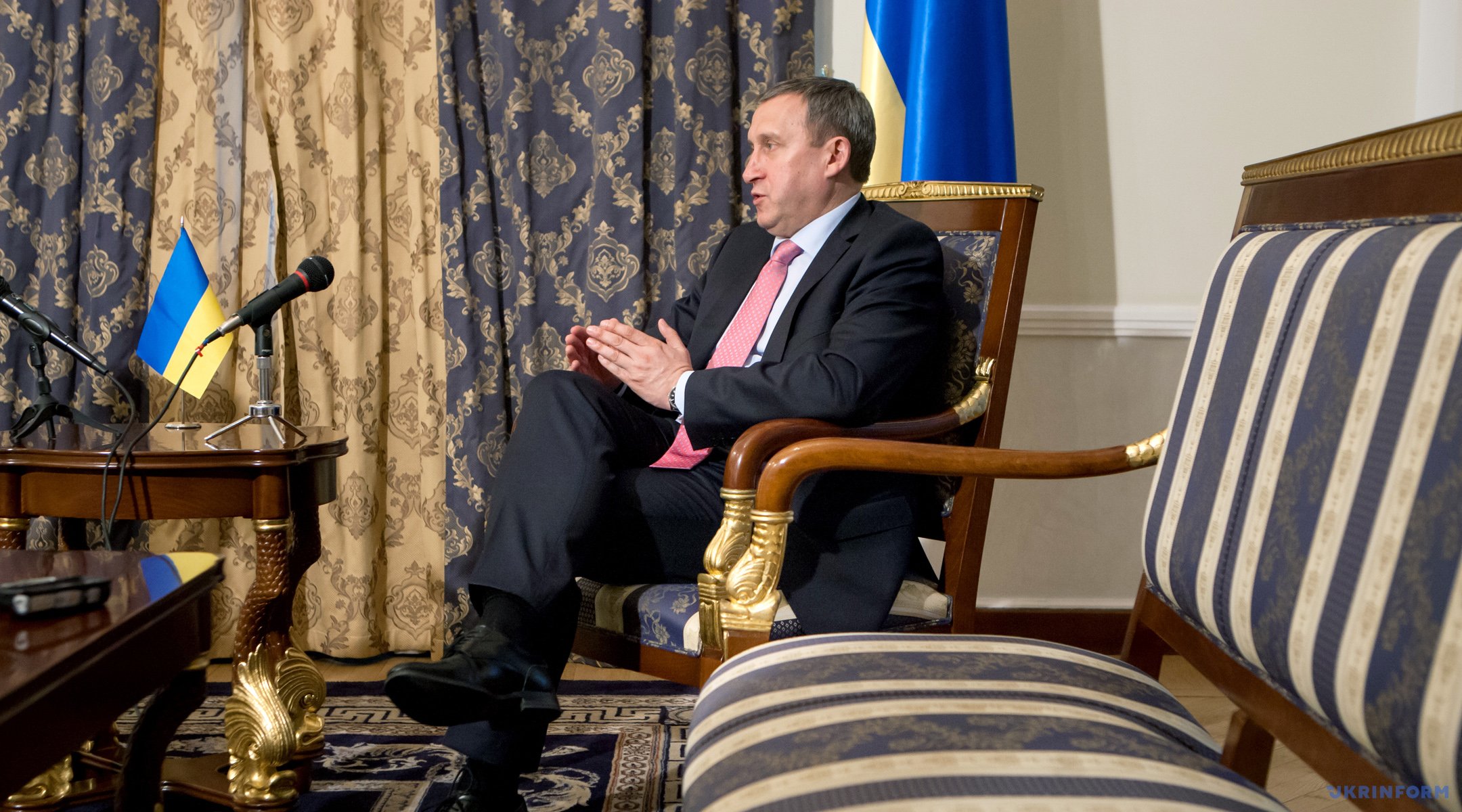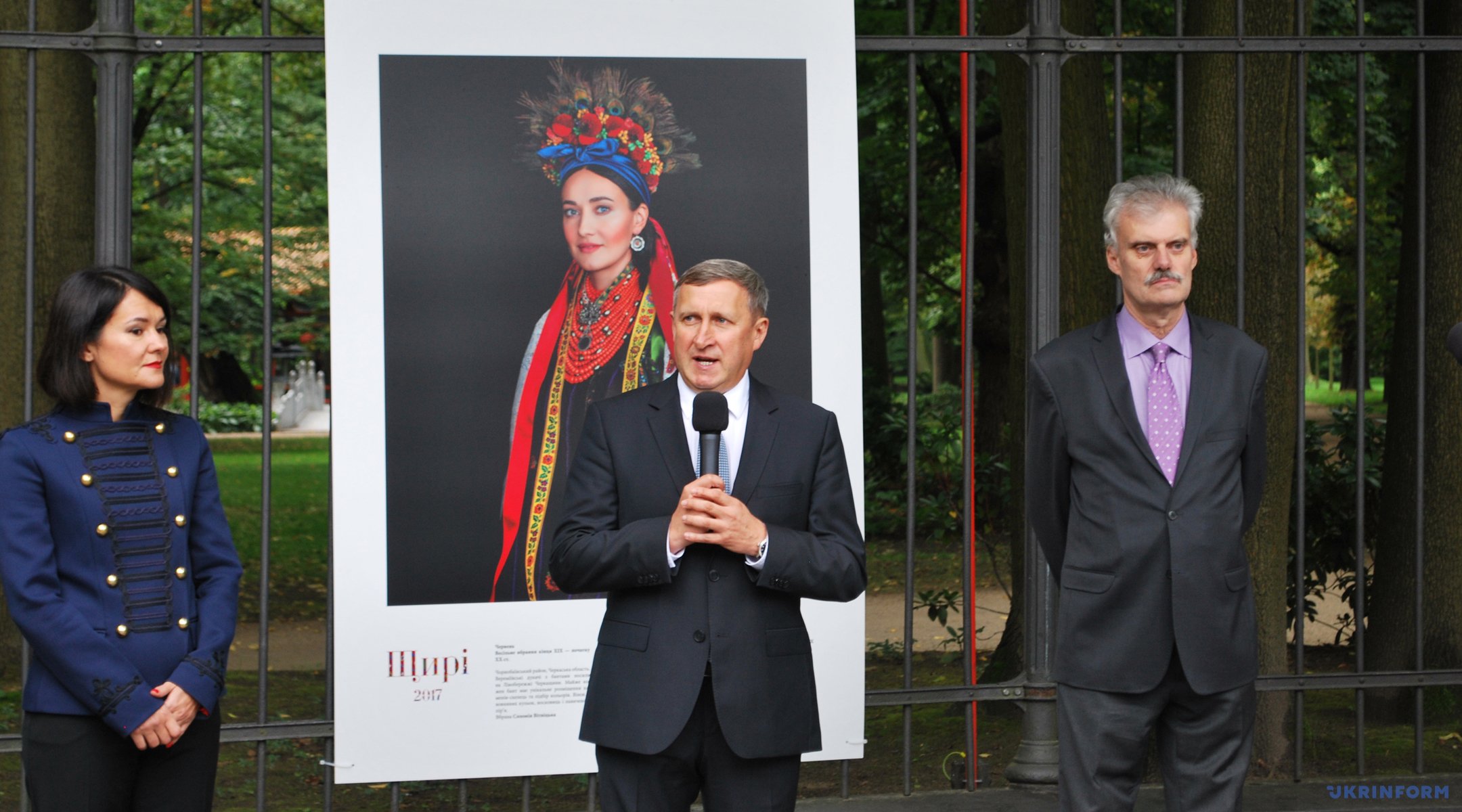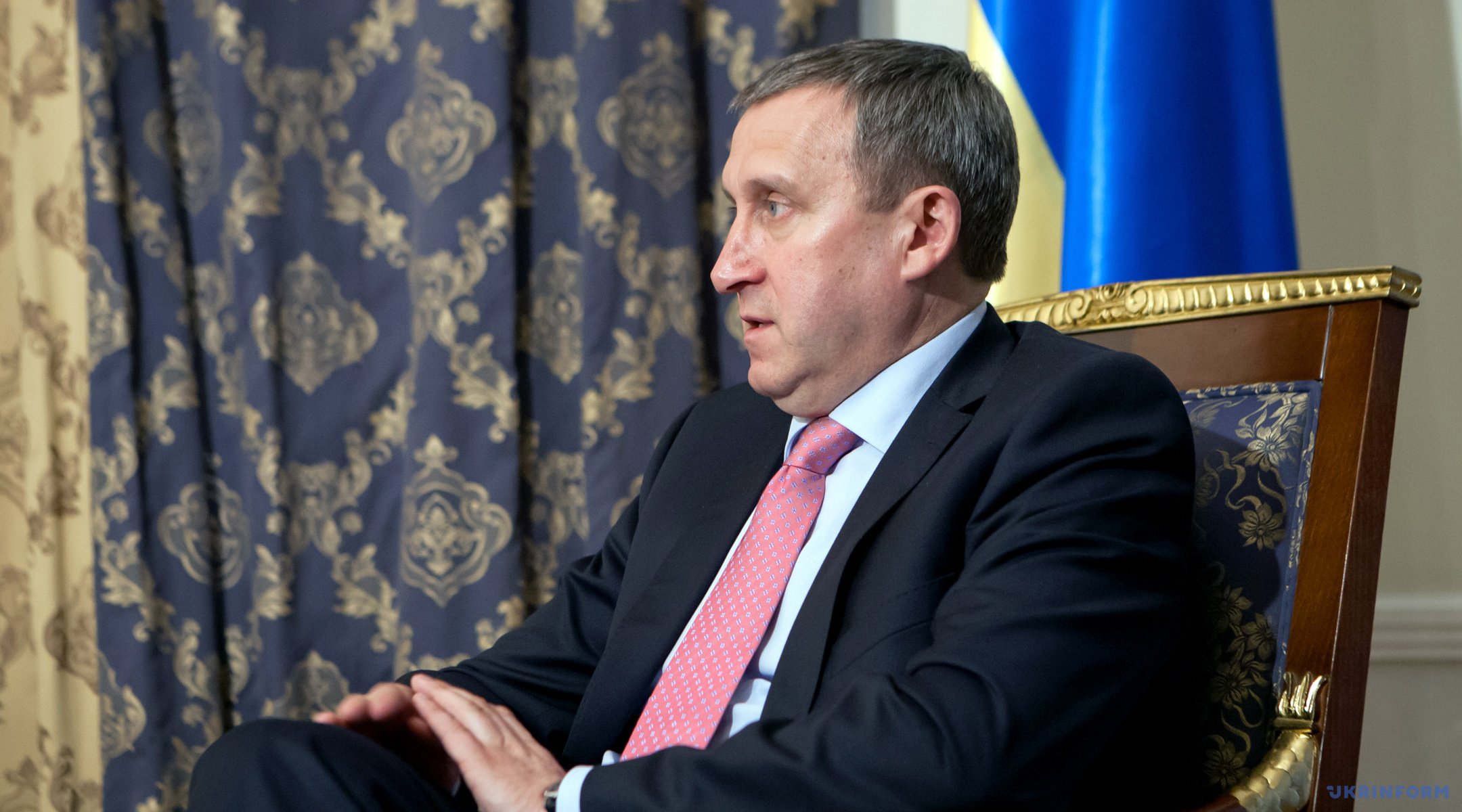Last Friday, Krakow hosted a meeting of the co-chairs of the Consultative Committee of the Presidents of Ukraine and Poland, Kostiantyn Yeliseyev and Krzysztof Szczerski. The meeting was quite lengthy (it lasted for more than four hours) and difficult, as Kyiv and Warsaw discussed the historical aspect of bilateral relations, which has recently begun to cast a shadow on the development of cooperation between the two countries in other areas.
This meeting was also attended by Ukrainian Ambassador to Poland Andriy Deshchytsia. In an interview with Ukrinform's correspondent, he spoke about the practical results of this meeting, Ukraine's view on the resolution of problems in the historical sphere, as well as the current state of Ukrainian-Polish relations.

Q: Mr. Ambassador, following the meeting the sides adopted a joint statement, which, in particular, says about the restoration of exhumation work by the Polish side in Ukraine. There is a public opinion that the result of the meeting suited Poland more than Ukraine. How do you assess the results of this meeting?
A: First of all, I want to emphasize that this meeting was held on the initiative of Ukrainian President Petro Poroshenko and was aimed at removing undesirable tension in the Ukrainian-Polish dialogue. The meeting helped ease emotions a bit. I want to note that the very atmosphere of the conversation as well as statements or positions expressed by the parties during the meeting, showed mutual readiness for constructive cooperation. Both sides acknowledged that this tension is not needed in our bilateral relations.
The media reported that one of the achievements of this meeting was the decision to resume search and exhumation work in Ukraine. But in fact, this was just one of the issues agreed by both parties in this joint statement. In addition, an understanding was reached on the restoration of Ukrainian places of memory in Poland, which have become objects of acts of vandalism since 2014.
Q: Does this apply to all destroyed places of memory?
A: About seven objects were damaged, and we talked about all of them. They will be restored step by step, taking into account the specifics of each particular case and all legal procedures.
Q: What agreements were reached in Krakow?
A: We agreed on an important event that should take place in the coming weeks. The issue concerns a visit by the Polish president to Ukraine. This visit should also confirm the interest of both parties in developing strategic partnership at all levels, in particular at the level of the heads of state. A visit to Kharkiv would emphasize the importance of the security factor of cooperation, given that Kharkiv is geographically located on the front line in the context of Russia's war against Ukraine. There are a large number of OSCE SMM staff members who are scheduled to meet with the Polish president to discuss security issues and provide their assessments of the security situation in the region. Representatives of Poland are one of the largest groups in the SMM. In addition, the visit is important in the context of Poland's non-permanent membership of the UN Security Council, which will also discuss various projects for the settlement of the situation in Donbas, including the UN peacekeeping component.

Q: What will be the status of this visit?
A: It will most likely be an official visit. The program is still being drafted, but it envisages an expanded security aspect. The details of the visit will be discussed during subsequent contacts between Ukraine's Presidential Administration and the Office of the President of Poland.
Q: The Polish foreign minister has recently spoken about the introduction of the so-called "black lists" of Ukrainians who are banned from entering Poland. The day after the meeting in Krakow, Secretary of the State Interagency Commission on the Commemoration of Participants in the Anti-Terrorist Operation, Victims of War and Political Repression Sviatoslav Sheremeta was refused entry into Poland. After that, our Foreign Ministry issued a statement that this was a violation of the agreements reached before. Please comment on this situation.
A: The existence of a list for the prohibition of entry into a certain country for citizens of other states is due to the fact that these persons can pose a threat to the national security of the state. This practice exists all over the world. Since the Polish Foreign Ministry said it had created lists that include Ukrainian civil servants, this issue was also discussed in Krakow. The parties recognized that it was necessary to work to ensure that such lists did not include persons who, despite other political and scientific beliefs, occupy positions in state bodies and do not endanger national security. It was agreed that on the initiative of the co-chairs the sides would consider again the existing lists, since they are created by the respective special services and each case should be considered thoroughly. Only those who really endanger the security of the country, who violated the law of the country, for example, because of the illegal visit to the occupied territory of Ukraine or participation in actions against territorial integrity and state sovereignty, should remain in these lists. Unfortunately, it happened so that the agreements were reached on Friday, and on Saturday Mr. Sheremeta went to the border. Of course, at that moment, these agreements have not yet begun to work.
Q: Did you raise in Krakow the question of the presence in this list of Sheremeta and Chairman of the Ukrainian National Remembrance Institute Volodymyr Viatrovych? After all, before this meeting, there were guesses that these individuals could be included in the "black list" of the Poles...
A: No, we did not discuss specific individuals by name. We spoke only about approaches to the formation of these so-called "black lists."
Q: The "black lists" are only a derivative problem. It is deeper, in contrast to the interpretation of the history of Ukraine and Poland. Head of the Polish National Remembrance Institute Jaroslaw Szarek has recently stated that, on the one hand, Warsaw cannot point to Kyiv who can be its heroes, and on the other hand, Poland cannot agree with the glorification of people in Ukraine who, from the point of view of Poland, are criminals. Have you discussed Krakow's attitude to history in a more global context?
A: These questions were not discussed in detail at a meeting in Krakow, as there are other institutions and mechanisms for this. In fact, the Consultative Committee of the Presidents of Ukraine and Poland should have promoted the work of these institutions and looked for ways for their cooperation. However, we must be aware that today we have a different vision of our past in Ukraine and Poland.
In Poland, this issue is more sensitive, including prior to the appearance of new facts that are published by Ukrainian historians. In Ukraine, after the Revolution of Dignity, the attitude towards the assessment of the historical past has changed.
The positive perception of the Ukrainian Insurgent Army in Ukraine in no way means anti-Polish sentiments. The UIA, first of all, is seen as a formation that fought for Ukraine's statehood and against Soviet aggression. However, we also have to assess for ourselves the role and place of the UIA in the process of nation-building. If the facts are clear that concrete UIDA units or members are responsible for crimes against the civilian population, then this must be condemned. First of all, this must be condemned for us, not for the Polish side. If we do this, then we will have a clear conscience and we will be able to emphasize that the UIA fought for Ukrainian statehood, but crimes against civilians are unacceptable in all circumstances, regardless of who committed them. And this approach should be universal not only in relation to the UIA, but also in relation to other military formations of different countries.

Q: The joint statement mentioned that Deputy Prime Ministers Pavlo Rosenko and Piotr Glinski would soon hold a meeting at which concrete decisions will be made on the restoration of exhumation work and commemoration of victims on both sides. Is it about raising these issues from the level of the national remembrance institutes of both countries to a higher level?
A: First and foremost, it means that search and exhumation work and the commemoration of places of memory should be carried out by institutions that are responsible for this. From the Ukrainian side, the institution responsible for such issues is the State Interagency Commission for the Commemoration of Participants in the Anti-Terrorist Operation, Victims of War and Political Repression, which is headed by Deputy Prime Minister Pavlo Rozenko. From the Polish side, Deputy Prime Minister and Culture Minister Glinski is partially responsible for these questions. Why partially? Because the competence of the Culture Ministry includes the issue of perpetuating places of memory, while search and exhumation work in Poland is overseen by the National Remembrance Institute. Therefore, this formula of cooperation will require the involvement of Polish National Remembrance Institute. Instead, these issues in our country are considered by the interagency commission, which also includes representatives of the Ukrainian National Remembrance Institute, other central government agencies, etc.
Q: We all understand who is interested in the deterioration of Ukrainian-Polish relations and who in fact initiated the destruction of monuments in previous years. In your opinion, are both parties aware that the more we quarrel, the more Moscow wins, and that we need to find a better understanding of history as soon as possible?
A: I saw this understanding at the level of the co-chairs of the Consultative Committee of Presidents. There is an awareness that we need to remain calm, continue our strategic cooperation and emphasize the significance of each other for Ukraine and Poland. In this situation, we need to develop the formula "There is no independent Poland without independent Ukraine and vice versa" and not to be subjected to provocations coming from different sides. In particular, we are talking about "anonymous" destruction of memory places in Poland. We cannot admit the "burial" of Ukrainian-Polish strategic partnership. This "burial" is in the hands of the forces that do not want to see independent Ukraine and independent Poland and our strong partnership, which plays an important role for European and regional security, including in counteracting the threats coming from the Kremlin's aggressive policy.
Q: Let's switch to other issues of Ukrainian-Polish cooperation. How do you assess it in other areas? Does Ukraine continue to feel the support of Poland internationally and bilaterally in the context of Russian aggression?
A: The question of history is very "hot," and we cannot exclude it from our bilateral dialogue. However, we cannot focus solely on this. Our cooperation is very successful in various areas. The issue concerns political, military and military-technical cooperation, cooperation in the field of energy, economy, intercultural and interregional development. All this is oriented for the future.
History, however important it was, is still the past that we cannot change. It should be remembered and honored, but we have to think about the future.
The statements of Polish politicians have been unchanged in recent years: they clearly take the position of protecting the territorial integrity of Ukraine, extending sanctions against Russia, bringing Ukraine closer to the EU and NATO, and further developing military and military-technical cooperation. There is an example of the Ukrainian-Polish-Lithuanian Brigade (LitPolUkrBrig), which has recently participated with Canadians in the Maple Arch exercises. The Polish delegation led by the Polish deputy energy minister visited Khmelnytsky NPP, which is one of the elements of the European Power Bridge - a combination of the Khmelnytsky NPP – Rzeszow line. In addition, we are talking about the construction of a gas interconnector between Ukraine and Poland, and we hope that it will be completed in the near future. Poland also maintains a clear position on blocking the Nord Stream 2 project. Poland is ready to discuss the issue of a peacekeeping mission in Donbas as part of its non-permanent membership of the UN Security Council in 2018-2019. This is all that is important to Ukraine and the whole of Europe in terms of security and further development.

Q: That is, cooperation is very intense.
A: Yes, it is. There are many examples of this kind. The association of rectors of the higher educational institutions of Ukraine and Poland have recently signed a memorandum of cooperation. A memorandum of understanding was also signed between the Ministry of Education and Science of Ukraine and the Ministry of National Education of Poland on the implementation of the Ukrainian law on education. We are also preparing a law on cooperation between the Ministry of Education and Science of Ukraine and the Ministry of Science and Higher Education of Poland. These are documents related to the development of cooperation in the academic and scientific spheres, which is very important to both countries. It builds the future through the training of specialists and the provision of opportunities for collaboration of scientists.
Last week, Poland also hosted several art festivals involving Ukraine - in Lublin, Olsztyn, Zielona Gora - and this happened only within a few days. Preparations are underway for the signing of bilateral agreements on border cooperation, which will facilitate the expansion of people-to-people contacts.
Q: We cannot even ignore the situation at the border. Verkhovna Rada Speaker Andriy Parubiy, along with his Polish counterpart Marek Kuchcinski, have recently traveled to the Polish-Ukrainian border and discussed the issue of improving the situation with the transit regime. How will cooperation between Ukraine and Poland develop in this direction?
A: There is a desire and understanding to increase the number of checkpoints at the border and improve the existing infrastructure. These issues require finance and time. It seems to me that it would be expedient to allocate accessible funds to improve and modernize the existing infrastructure on the Ukrainian-Polish border, including roads from the Ukrainian side. In addition, it is also important to expand the capacity of those crossing points, where possible, and build new ones. However, this requires a certain amount of time and investment. There is an understanding on both sides of the border that it needs to be done, and that this is a matter of more than one year. We hope that this will be taken into account in the budgets of both countries for the coming years. This is why the heads of parliaments organized visits to several checkpoints before the adoption of budgets in order to take this into account in the financial perspective for the next year.
Q: Ukraine is now struggling to support sanctions towards Russia in the West. Has Warsaw weakened support for this policy, given some cooling of relations between our countries?
A: We have not seen it so far. Moreover, this is not even the question of Ukrainian-Polish relations, but the question of European security and the observance of international law. Poland demonstrates consistency and determination here, voting for maintaining sanctions policy against Russia. However, it is becoming increasingly difficult, including for Poland, to convince other EU countries of the need to maintain sanctions against Russia. I hope that the EU will continue to maintain unity and solidarity and, if necessary, even strengthen sanctions until Russia's full fulfilment of its commitments regarding the implementation of the Minsk agreements and the return of occupied Crimea to Ukraine.
Yuriy Banakhevych. Warsaw
